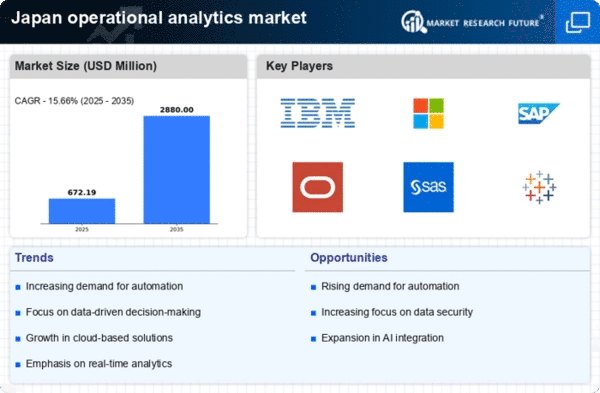Growth of IoT Integration
The integration of Internet of Things (IoT) technologies is a key driver for the operational analytics market in Japan. As IoT devices proliferate across various sectors, the volume of data generated is increasing exponentially. This influx of data presents both challenges and opportunities for organizations. By harnessing IoT data through operational analytics, businesses can gain valuable insights into their operations, leading to improved decision-making and predictive maintenance. It is projected that the IoT analytics market will reach $10 billion by 2026, indicating a robust growth trajectory. This integration of IoT with operational analytics is likely to enhance operational visibility and drive innovation within the market.
Emphasis on Operational Efficiency
In Japan, the operational analytics market is significantly influenced by the emphasis on operational efficiency. Organizations are increasingly adopting analytics solutions to streamline processes and reduce costs. By utilizing data analytics, companies can identify inefficiencies and optimize resource allocation. Reports indicate that businesses implementing operational analytics can achieve cost reductions of up to 20%. This focus on efficiency not only enhances profitability but also fosters a culture of continuous improvement. As Japanese firms strive to maintain competitiveness in a global market, the operational analytics market is expected to expand, driven by the quest for enhanced operational performance and resource optimization.
Rising Demand for Real-Time Insights
The operational analytics market in Japan experiences a notable surge in demand for real-time insights. Organizations are increasingly recognizing the value of immediate data analysis to enhance decision-making processes. This trend is driven by the need for agility in operations, allowing businesses to respond swiftly to market changes. In 2025, it is estimated that the market for real-time analytics solutions will grow by approximately 25%, reflecting a shift towards data-driven strategies. Companies are investing in advanced analytics tools that provide instant feedback on operational performance, thereby improving efficiency and productivity. This rising demand for real-time insights is likely to propel the operational analytics market forward, as businesses seek to leverage data for competitive advantage.
Regulatory Compliance and Risk Management
Regulatory compliance remains a critical concern for businesses in Japan, influencing the operational analytics market. Companies are increasingly required to adhere to stringent regulations, necessitating the implementation of robust analytics solutions to monitor compliance and manage risks effectively. The operational analytics market is expected to grow as organizations invest in tools. These tools facilitate compliance reporting and risk assessment.. In 2025, it is anticipated that the market for compliance analytics will expand by 15%, reflecting the growing importance of risk management in operational strategies. This focus on regulatory compliance is likely to drive demand for operational analytics solutions that provide transparency and accountability.
Advancements in Data Visualization Technologies
Advancements in data visualization technologies are shaping the operational analytics market in Japan. As organizations seek to make sense of complex data sets, the demand for intuitive visualization tools is on the rise. These technologies enable users to interpret data more effectively, facilitating better decision-making. In 2025, the market for data visualization solutions is projected to grow by 30%, underscoring the importance of visual analytics in operational strategies. By leveraging advanced visualization techniques, businesses can enhance their analytical capabilities, leading to improved operational insights. This trend is likely to propel the operational analytics market as organizations prioritize data accessibility and usability.
















